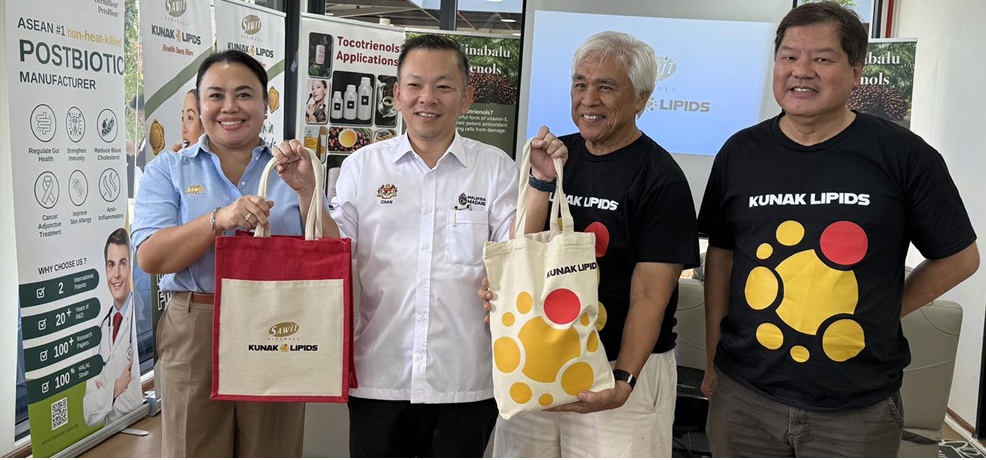
By Dr Rahim Said
When Chan Foong Hin, the Deputy Minister of Plantation and Commodities and Member of Parliament for Kota Kinabalu, visited Kunak Lipids Sdn Bhd on Oct 14, he wasn’t just touring another palm oil facility.
As a chemical engineer by training, Chan understood the significance of what was unfolding before him — a quiet but potentially transformative shift in Malaysia’s palm oil story.
Kunak Lipids, a small but ambitious biotech company in Sabah, has been on his radar since its inception. He even witnessed the company’s signing ceremony with Boce Pte Ltd for the export of natural tocotrienols to China — a historic first step for a Malaysian firm turning what was once considered palm refinery byproducts into a high-value nutraceutical ingredient.
From Commodity to Chemistry
For decades, Malaysia’s palm oil narrative has been anchored on upstream production — crude oil, bulk exports, and volatile pricing. But the future lies downstream, in value-added bioproducts, where innovation and science create new markets.
Tocotrienols — a lesser-known form of Vitamin E — embody that shift.
Unlike conventional tocopherols, tocotrienols have been scientifically proven to possess stronger antioxidant, anti-inflammatory, and neuroprotective effects. They are now sought after in global health and wellness industries for promoting heart, brain, skin, and metabolic health.
Sabah, long seen as a raw material supplier, could now position itself as a hub for bio-based innovation. Kunak Lipids is already showing the way.
The Promise of Self-Reliance
Chan noted during his visit that local production of Vitamin E from palm-based tocotrienols could significantly reduce Malaysia’s dependency on imported nutraceutical ingredients.
Today, most Vitamin E used in supplements and cosmetics is imported from Europe, the US, or Japan — often at premium prices.
If Sabah succeeds in producing high-purity tocotrienols domestically, Malaysia could not only save foreign exchange but also develop a more resilient supply chain for its health and cosmetic sectors. The ripple effect would extend to R&D, manufacturing, and skilled employment.
This is industrial transformation from within — the kind policymakers often speak of, but which rarely materialises beyond white papers and PowerPoint slides.
Innovation Beyond Capsules
Kunak Lipids’ research team has gone further than expected for a company at this stage. During the visit, Chan was shown Oral Disposable Films (ODFs) — dissolvable strips infused with tocotrienols.
These novel films are designed to aid sleep, relieve headaches and hangovers, improve blood circulation, and even enhance vitality naturally when combined with local herbs.
Such innovations reflect a broader shift in consumer health — from pills and tablets to functional, fast-acting, and lifestyle-integrated formats.
The inclusion of Kota Marudu dark cocoa in new tocotrienol-based energy bars, chocolate flakes, and health beverages is another clever example of integrating local identity with global wellness trends.
In a world where people increasingly reach for “natural” and “clean-label” solutions, Sabah’s palm-derived tocotrienols could find a receptive audience.
The Gut Health Frontier
One of Kunak Lipids’ most promising developments is its tribiotics formula — a blend of prebiotics, probiotics, and postbiotics enriched with its proprietary SKT3 tocotrienols.
This is no small breakthrough. Gut health is now recognised as a foundation for overall well-being, influencing immunity, metabolism, and even mental health.
By marrying tocotrienols with microbiome science, Kunak Lipids is positioning itself at the cutting edge of the global health and wellness industry — a sector projected to exceed USD 8 trillion by 2030.
Sabah’s Emerging Bioeconomy
The company is now exploring collaboration with Chinese R&D and manufacturing partners, coordinated by PORTSIM, to facilitate entry into the vast China market — the world’s largest and fastest-growing nutraceutical consumer base.
Such partnerships could accelerate technology transfer and global reach while keeping Malaysia at the heart of production. For Sabah, this means the potential birth of an entirely new bioeconomy cluster — one that valorizes palm oil byproducts instead of exporting raw crude palm oil.
A National Model in the Making
Kunak Lipids’ journey is not just about one company’s success. It is a case study in Malaysia’s industrial reinvention — proving that science-led entrepreneurship can unlock new value from old industries.
If nurtured with the right policy support — from R&D incentives to export facilitation — Sabah’s tocotrienol initiative could become a model for sustainable industrial development. It would demonstrate that innovation, not acreage, defines the next phase of Malaysia’s palm oil story.
From Kunak to the World
In the broader context of global health trends, tocotrienols may soon become Malaysia’s next big wellness export, alongside Musang King durians and bird’s nest. But unlike these, tocotrienols are a scientific export, not just a natural one.
If Malaysia can secure a strong foothold now — leveraging its natural advantage as the world’s largest palm oil producer — the phrase “Sabah Tocotrienols” might one day stand beside “Swiss Vitamins” and “Korean Skincare” in the global vocabulary of health and beauty.
It’s an opportunity not just to add value, but to redefine value — by turning palm byproducts into life-enhancing molecules for the world.
And that, as Chan’s visit suggests, is the real promise of the tocotrienol revolution now quietly brewing in Kunak.
Dr Rahim Said writes regularly for Weekly Echo on technology, policy, and Malaysia’s innovation economy, highlighting how science and strategy can transform traditional industries into drivers of sustainable growth.
WE